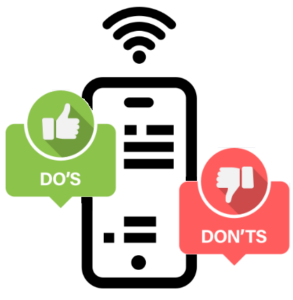 Clinical trials allow us to test and see whether a particular treatment -an investigational drug or other intervention- might benefit a particular group of people. These trials are essential to determining whether a treatment is safe and effective, therefore are designed and conducted in specific ways that maximize the information we gain about the benefits and side effects of the treatment being studied.
Clinical trials allow us to test and see whether a particular treatment -an investigational drug or other intervention- might benefit a particular group of people. These trials are essential to determining whether a treatment is safe and effective, therefore are designed and conducted in specific ways that maximize the information we gain about the benefits and side effects of the treatment being studied.
In order to keep clinical trial data as objective as possible, it is important for us all to consider where we share information about our trial participation, and what kind of information we share.
Communities like our Fragile X community tend to be small, tight-knit groups who do a lot of researching and information sharing, mostly through the internet. We often consider our online community as close friends, and we easily connect with others who may be going through the same experiences we are. It is very easy to accidentally “overshare” information that might be seen as helpful to the community, but harmful to the research study.
With the help of clinical trial sites, specifically Dr. Vicki Wilkins and her research team at the University of Utah and Primary Children’s Hospital, we have put together a few dos & don’ts to help guide you when deciding what information to share about the research you are participating in and what information you should keep more private.
Do:
👍 Feel free to discuss the study generally with your family and other people who are close to you who are not in the study.
👍 Tell any health care providers who treat you that you are in a study/trial.
👍 Tell the research team immediately if you have any questions, unusual side effects, or concerns!
👍 Share general tips. Example: “The parking garage is a far walk from the research building. Give yourself extra time to get to your appointment!”
👍 Share general experiences. Example: “The blood draw procedure was difficult, but the study staff was super helpful!”
👍 Share general recommendations for things that worked for you during study visits. Example: “I recommend queuing up your kiddo’s favorite video on your phone/iPad before and during the blood draw. That was a great distraction that worked for us!”
👍 Share general thoughts/feelings about your participation, leaving out specific details. Example: “I really enjoyed having my son participate in this trial. Being a part of research makes us feel like we are doing something to help find a cure.”
👍 Connect with others in similar shoes; feel a sense of community in knowing that others are going through a similar process as you. Participating in clinical trials can feel isolating, but you’re not alone! Social media platforms can be an excellent source of connecting with community, just be sure you’re connecting on the experience and not sharing privileged details with others who are on their own journey!
Don’t:
👎 Share specific information about your experience in the study/trial in public spaces while the study/trial is in progress. Public spaces include support groups, online message boards, in-person social gatherings, or conversations with friends who may be thinking about participating in the study/trial.
👎 Share personal health information.
👎 Share information on how to be eligible for a study. Let the study staff handle that!
👎 Share your opinions/observations of changes (good or bad!). This could skew the data and have negative effects on the study when it’s time for the FDA to do its review of the study. Remember, the FDA is ultimately in charge of approving the treatment for use.
👎 Share any information about the study medication/treatment.
👎 Share information on possible side effects. Talk these through with your study doctor!
When we participate in clinical trials, we must tread carefully while sharing information and ensure that our conversations and interactions with others don’t introduce bias into the conduct of a trial or raise questions about the validity of the data, which might delay progress of the new therapy and make other patients wait longer to receive it. We want to foster feelings of support and connection while still conducting high quality research to benefit people who are affected by Fragile X syndrome!
We all want those enrolled in clinical trials to “get better” but we have to be as objective as possible while looking for potential change. This goes for parents, caregivers, and Fragile X clinicians and scientists. In order to do this we need to keep our thoughts and opinions about potential change with treatment a bit to ourselves to avoid influencing others participating in trials, whether that means families or the research team members.
If you’d like to learn more about why this matters, check-out this primer from CISCRP that explores the power of words, showing you how to speak out, but “speak smart.”
If you have any additional questions about participating in a clinical trial, please email anna@fragilex.org.
“We all want those enrolled in clinical trials to ‘get better’ but we have to be as objective as possible while looking for potential change. This goes for parents, caregivers, and Fragile X clinicians and scientists. In order to do this we need to keep our thoughts and opinions about potential change with treatment a bit to ourselves to avoid influencing others participating in trials, whether that means families or the research team members.”






